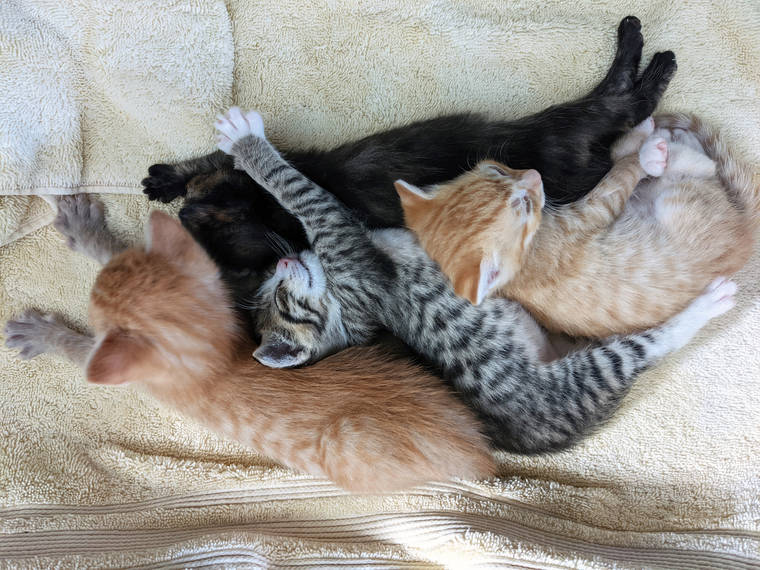LIHU‘E — It’s kitten season on Kaua‘i, and the Kaua‘i Humane Society has a few suggestions for people who run across them on their property or elsewhere on Kaua‘i.
“Newborn kittens need to be left with their mother if possible,” said Nicole Schafer Crane, executive director at KHS. “People often bring kittens into the shelter because they were found abandoned. Mama cats will leave their kittens alone for periods of time so she can eat, but more than likely she will return to the babies.”
According to Crane, newborns should only be brought into the shelter if the rescuer is certain that the mother has not returned to the kittens for at least 24 hours. This is because a mother cat will nurse the kittens, help regulate their body temperature, and stimulate the kitten so that it goes to the bathroom.
“When a mother cat is not around, that means a person has to take over those tasks manually,” Crane said. “For every newborn kitten we have, we have to find volunteers willing to ensure the kitten is warm at all times and can be fed every couple of hours for the first several weeks of its life.”
Crane said it is important to ensure that KHS has a steady stream of volunteers, fosters, supplies, and donations especially when every spring when they see an influx of bottle baby kittens coming in. KHS receives hundreds of kittens every spring that needs individualized care.
“Because Kaua‘i’s climate is so steady year-round, we get litters in year-round,” Crane said. “We receive even more litters than normal in the spring once the rains have slowed and the weather warms.”
The Kauai Humane Society currently has 127 kittens of which 86 kittens are in foster care, 15 are waiting for their foster family to come to get them, and two are available in-house.
The rest of the kittens are undergoing medical treatment of some kind and aren’t available for adoption or are on hold.
“When we get in animals with identification, we hold them for nine days before we put them up for adoption in hopes that their owner will come for them,” Crane said. “Animals without ID are held for two days before placed for adoption. Some kittens come in with ringworm or upper respiratory infections, so we make sure to provide treatment and get them healthy before they are available for adoption.”
Crane said kittens get adopted frequently and fast. A lot of people coming into the shelter are looking for cute little baby animals.
“So, although we can be inundated with kittens in the springtime, once they are old enough to be adopted, they do go relatively quickly,” Crane said.
According to Crane, cats live healthier and happier lives when kept indoors. Cats are natural hunters and want to go after birds and lizards, but that can sometimes introduce them to diseases and dangers such as getting hit by a car or ingesting something that will make them sick.
“Keeping your cat indoors not only extends its life but can also protect our native species,” Crane said.
Crane said that spaying or neutering your cat is essential as it keeps unwanted litters from ending up in the shelter. Fixing your cat can also decrease the chance of certain cancers like breast cancer in female cats, and deter certain behavioral issues such as spraying in male cats. These benefits work better if the cat is fixed a an early age. According to Crane, cats can be fixed as early as eight weeks.
In 2020, KHS rescued 1,644 kittens that needed their basic needs met — food, water, play, and shelter.
“When you adopt a kitten, they will need food, a water bowl, a small bed, treats, toys, a litter pan, and litter,” Crane said.
Crane said KHS sells a starter pack to help you get started caring for your new kitten.
“If your pet is coming from the shelter, we will spay or neuter it, vaccine it, microchip it, and give it dewormer and flea & tick preventative,” Crane said. “If your pet doesn’t come from the shelter, you want to make sure that you’ve taken care of all of those steps to keep your pet healthy and happy.”
•••
Stephanie Shinno, education and business reporter, can be reached at 245-0424 or sshinno@thegardenisland.com.





“Keeping your cat indoors not only extends its life but can also protect our native species,” Crane said. Exactly. So, humane euthanasia to control further destruction of native and indigenous species must be maintained.
Someone has been putting cat food alongside of the sidewalk by Costco…Pikake Street side for at least a couple years or more. What is concerning is there are HUGE and I mean HUGE snails…many of them…also are enjoying the food. Could these snails also be carriers of the Rat Lung disease? What happens when the cats also consume the food?
Basically it seems like a health issue at some point, maybe?